×
SparkFun will be closed Nov. 28th and Nov. 29th in observance of Thanksgiving. Any orders qualifying for same day shipping placed after 2:00 p.m. MST on Wednesday, Nov 27th will be processed on Monday, Dec 1st. Wishing you a safe and happy holiday weekend from all of us at SparkFun!
Bartendro Dispenser - Peristaltic Pump and Controller
Do you need to precisely dispense amounts of liquid for your preferred beverage? If so this could be the pump for you. This is the Bartendro Dispenser from Party Robotics, an ingeniously designed peristaltic pump and controller that can be used to dispense liquids with milliliter accuracy and can be used in a stand alone system or with a router and other pumps for a more complex liquid dispensing system. This peristaltic pump works through positive displacement, two rollers are attached to a single motor that spins around a Norprene® tube pinching it closed to force your beverage liquid to be pumped through. With this method you won't need to worry about your liquid flowing through any moving parts, it will bypass the need for flow meters, and you will be able to meter the amounts of beverage liquid independent of viscosity and density.
Unlike most peristaltic pumps, the Bartendro Dispenser comes equipped with a controller board (driven by the reliable ATMega168), RJ45 and liquid level sensor connectors, and even a few WS2801 RGB LEDs just to make your drink provider all the more pretty.
The only things that the Bartendro really need to get going is a bit of motor power (minumum of 12V, max 24V), logic power, and serial communication all of which are supplied over the RJ45 jack found on the back of the board. Basically all you need to do is form a serial communication with this board via Arduino, Raspberry Pi, pcDuino, or any other development board of those natures and you will be good to start pouring!
Note: The Bartendro Dispenser is NOT intended for medical use.
- 1x Bartendro Dispenser
- 1x 5ft Clear Tygon S3™ Tubing
- 2x Compression Nut
- Max Flow rate: 700mL/ min
- Minimum Motor Voltage (Vin): 12V
- Motor Voltage (Vin): 24V
- Minimum Dispense Volume: 0.5mL if using PWM
- Repeatability: 1mL or better
- Current Consumption at 24V: up to 500mA while dispensing
- Max Vertical Tubing Length: about 10ft
- Max Length of Serial Connection: 10ft
- Tube Life: 500 Hours
- Food Safe
- Schematic
- Eagle Files
- Product Page
- Food Safe Documents:
- GitHub (Software Library, Example Code, & Design Files)
- GitHub (Documentation)
- Product Video
Bartendro Dispenser - Peristaltic Pump and Controller Product Help and Resources
Core Skill: DIY
Whether it's for assembling a kit, hacking an enclosure, or creating your own parts; the DIY skill is all about knowing how to use tools and the techniques associated with them.
Skill Level: Noob - Basic assembly is required. You may need to provide your own basic tools like a screwdriver, hammer or scissors. Power tools or custom parts are not required. Instructions will be included and easy to follow. Sewing may be required, but only with included patterns.
See all skill levels
Core Skill: Programming
If a board needs code or communicates somehow, you're going to need to know how to program or interface with it. The programming skill is all about communication and code.
Skill Level: Rookie - You will need a better fundamental understand of what code is, and how it works. You will be using beginner-level software and development tools like Arduino. You will be dealing directly with code, but numerous examples and libraries are available. Sensors or shields will communicate with serial or TTL.
See all skill levels
Core Skill: Electrical Prototyping
If it requires power, you need to know how much, what all the pins do, and how to hook it up. You may need to reference datasheets, schematics, and know the ins and outs of electronics.
Skill Level: Competent - You will be required to reference a datasheet or schematic to know how to use a component. Your knowledge of a datasheet will only require basic features like power requirements, pinouts, or communications type. Also, you may need a power supply that?s greater than 12V or more than 1A worth of current.
See all skill levels
Comments
Looking for answers to technical questions?
We welcome your comments and suggestions below. However, if you are looking for solutions to technical questions please see our Technical Assistance page.
Customer Reviews
3 out of 5
Based on 1 ratings:
4 of 4 found this helpful:
Decent, but definitely room for improvement
Pros: - Once it's working, easy to run. No need to worry about running air through it. - Easy to mount. - Relatively easy to dis- and re-assemble if need be (I had to take it apart a few times for my project)
Cons: - The biggest thing by far is the lack of documentation on communicating with the board (especially troubleshooting). If you don't use an Arduino (we used a TI micro controller) and the expensive router board, be prepared to spend quite a while hacking together some code to make it work. - Pumps pretty slowly, even at max speed. - Expensive.

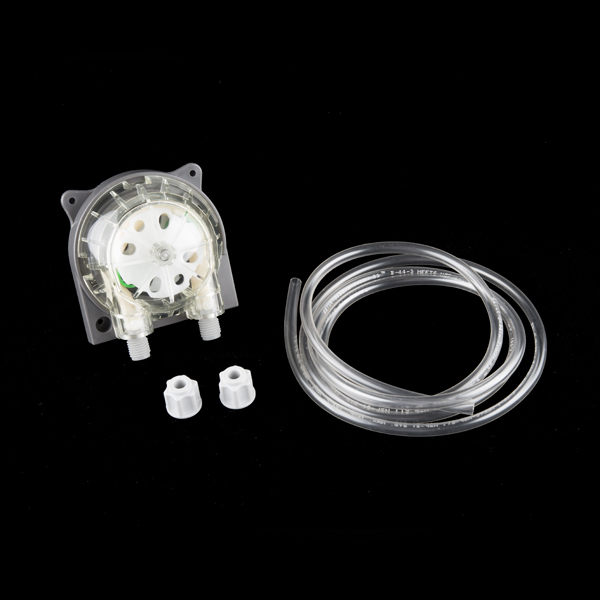
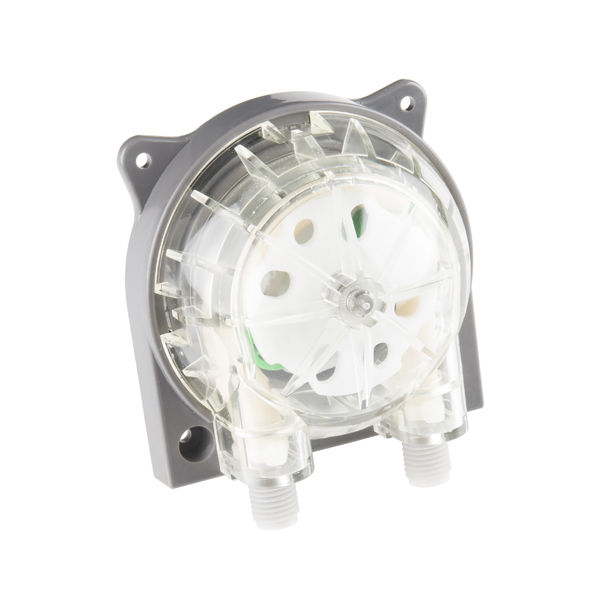
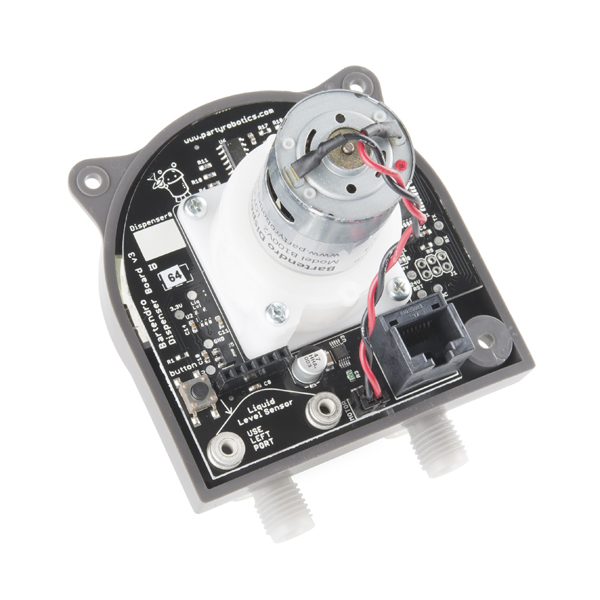
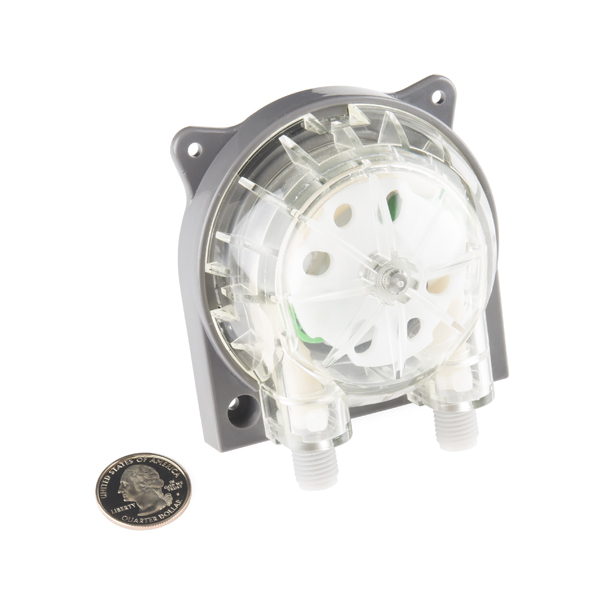
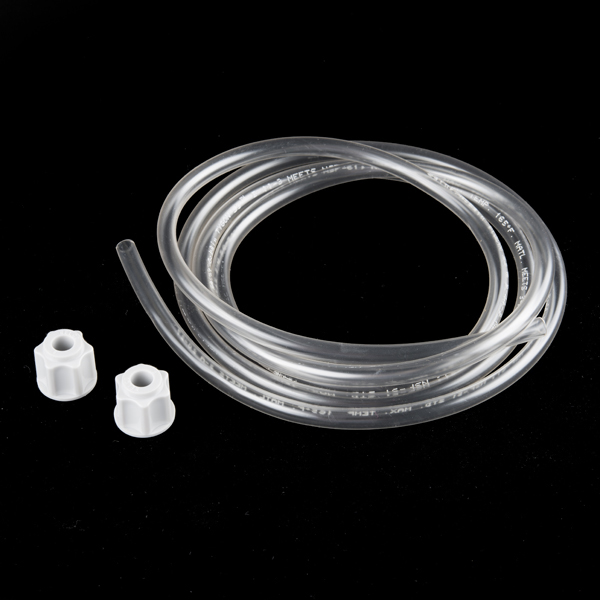
Is there a temperature limit for the internals of the pump? We have a project using hot water (210 F) and this looks like a decent fit.
Fluid never really enters the pump, it always stays in the tubing so the pump itself is probably fine with 210°. The maximum temperature for the Tygon pump tubing is about 165° Fahrenheit though (74°C) so that's really your limiting factor.
Errr... Sorry, it's how much???
A good price by medical equipment standards but as the only need for 'food-safe' is the tube and that's only rated for a life of 20 days continuous use, I think it will be a stepper motor, a bit of design time and a trip to the local 3D printer for me...
we produce intelligent flow peristaltic dosing pumps, flow rate 0.00011-13000mL/min (suncelsue@aliyun.com ), welcome you contact us. www.bdfluidpump.com
I concur. It's too slow to fill a full sized glass. Heck it was slow to even fill the shot glasses in the demo video.
Better solutions? Gravity + stainless solenoid valve. (non-pilot else it won't work since they have a minimum pressure requirement and it can't be brass because those usually contain trace amounts of lead, which is way too dangerous to risk) Or.... use the sparkfun vaccuum pump (which can also pump pressure) to pump pressure into the top of the bottles to pressurize and force the liquid out through a second tube that goes down to the bottom of the bottle. Peristaltic pumps are too noisy and slow for an efficient bar-bot. Definitely the easiest method, but not the most elegant, slick, or quiet.
Same here. I have gotten some nice beefy gear motors from Pololu. They also have drivers, controllers, encoders, etc.
I presume you are going to attach a stepper motor to a 3D printed pump of your design. If you do will you share it with me ? I will post it on my blog .... Gus in Denver yes at nope9.com http://arts-tech-creation.blogspot.com/
Hello ,
Has anyone try to controll one pump directly from an arduino ? If some one has , would mine sharing the code . Thanks
Did you get some help? I'm having problems controlling the pump with arduino
I second that.
Did you get the pump to work with arduino?
“Food Safe” certifications from the FDA and NSF are not necessarily the same as “Alcohol Safe”; I’d do your homework if you intend to drink/serve a lot of strong liquors through this pump. In my opinion the Peristaltic Pump is not the best option when building a bar – this was my bar from 2005: http://youtu.be/08s1ZFZcAaU
If need peristaltic dosing pumps, pump heads,OEM pump and tubes, flow rate 0.0011-13000mL/min for your choice. Our email: suncelsue@aliyun.com, www.bdfluidpump.com
What should we be looking for? A chemical reaction with the tubing? My cursory search on "Alcohol Safe" did not turn up much. Neat system in your link! Wouldn't the CO2 system carbonate the drinks? If I remember correctly maintaining ~2atm is all that is needed. And that pressure drops with temperature.
Casey, not sure if this is still relevant to you six months later... but in general when specifying something like a polymer for a peristaltic pump you should be looking for solvent compatibility. Many polymer suppliers will have tables that give at least a general ideal of whether something is suitable for use with a particular fluid. They often come with caveats, however, like the operating temperature. Frequently any tests conducted were probably a room temperature.
Sometimes you might have to worry about a chemical reaction, say if you were pumping something like concentrated sulfuric acid. In the case being discussed here, the alcohol is likely just acting as a solvent.
Hey Casey - Alcohol is a pretty aggressive liquid and will leach unwanted chemicals out of plastic tubing. FDA 21 and NSF 51 only cover booze containing less than 15% alcohol. It’s pretty difficult to carbonize a liquid; it requires higher pressure and temperatures near the freezing point. In most fast food joints they’ll utilize ‘Carbonators’ and large aluminum ‘Cold Plates’ to carbonize the water that’s mixed with their soda syrups (check out soda supply websites for an example setup).
http://www.ensinger-inc.com/downloads/support/Ensinger%20Food%20Products%20Regulatory%20Guide.pdf
I have some experience with this type of pump in prosthetics R&D. I use it in a manikin to deliver fake sweat at a precise rate. This type of pump is also used as a vacuum pump in prosthetic applications. The pump is so simple to build that it hardly seems worth the price quoted here. I don't see much added value in the processor, motor driver, etc. since you can get them for 20 or 30 bucks. Not that hard to calibrate it using an 8 oz. coffee cup, since it's not lab grade anyway.
It has a lot to do with how much your time is worth. Yes, you can buy a cheap dosing pump on eBay, replace the tubing with something you're comfortable drinking through, add a motor controller then write a library to communicate with the pump and calibrate it...
Let's run the experiment:
Dosing Pump 12V eBay $14
Norprene A-60-F Tubing, maybe $2 (if you can buy only a foot)
Tygon B-44-3 Tubing, maybe $10
Motor Driver $10 (MiniMoto BOB-11890)
Controller $10 (Arduino Pro Mini)
So that's a total of $46 material costs (less shipping)... If you can build the pump in one 6-hour day and your time is only worth $14/hour... you'll break even.
...except that your pump won't have an encoder and will pump at a max rate of 1/7 the speed of the Bartendro.
I'm not saying you can't do it, but if you do then get in touch with us because we might sell it.
And I say that only as someone who had the same reaction as you.
I want to build a lead free solder paste dispenser using this pump. The idea is to avoid compressed air. And to dispense exact ammounts of solder paste in an automated process. Looks like viscosity is not a problem so, do I give this a try?
I think I will stick with this http://www.adafruit.com/products/1150 $25 one from adafruit.
If need peristaltic dosing pumps, pump heads,OEM pump and tubes, flow rate 0.0011-13000mL/min for your choice. Our email: suncelsue@aliyun.com, www.bdfluidpump.com
They are very different. The adafruit one won't do 'dosing' without some work. Ours has an encoder, so you can precisely pump liquids. Say you want 3mL, you can easily dial that in, and get exactly that. With the other pump, you would be at the mercy of just having it turn on for a period of time and turning it back off again, and it won't dispense a precise amount of liquid.
Does anyone know what size External Tubing this pump uses? Is it 1/4" ID or 1/8" ID
If need peristaltic dosing pumps, pump heads,OEM pump and tubes, flow rate 0.0011-13000mL/min for your choice. Our email: suncelsue@aliyun.com, www.bdfluidpump.com
Neither. It should be 6mm OD / 4mm ID.
This pump is actually the WP1100 from Welco, and it should be the WI6 fitting type.
http://www.welco.net/product/wp1000_1100/wp1000_1100_guide/wp1000_1100_guide06.html
I was initially thinking that it could be the J4 fitting type, but if you compare to the compression fittings featured in Bartendro's assembly guides:
http://cdn.shopify.com/s/files/1/0455/5013/files/M130V2.pdf?390
You'll see that the pictures of the compression fittings in their guide, matches the compression fitting on the WI6 type on Welco's site.
http://www.elecrow.com/mini-water-pump-p-621.html
same function at less than $4.
That would be more a part of this than a comparable product.
http://www.adafruit.com/products/828
Almost the same thing only at a 1/12th of a price.
I don't think you understand... This device is designed to dispense extremely precise amounts of liquid... not measure liquid flow.
If need peristaltic dosing pumps, pump heads,OEM pump and tubes, flow rate 0.0011-13000mL/min for your choice. Our email: suncelsue@aliyun.com, www.bdfluidpump.com
A flow meter and a peristaltic pump are "almost the same thing"?
If you define all pumps as being the same I guess. But it's like saying all people are the same.
Google has failed me. Norprene seems to be resistant to a LOT of chemicals. Is it resistant to resin? (Like a combination of the B9Creator and the bottom up approach of the Peachy Printer)
Super Expensive. Check out the GreyBeard peristaltic pump. http://www.amazon.com/Grey-Beards-Niagara-Rotary-Pump/dp/B00AN72VOI/ref=sr_1_6?ie=UTF8&qid=1400879607&sr=8-6&keywords=peristaltic+pump
Or, you know, http://www.adafruit.com/products/1150
Not exactly a fair comparison. This pump comes with the driver, a micro controller, and some software pre-loaded to meter dispensing. And this is made of Food safe hardware.
Granted, but the only "food safe" part is the tubing. Also, see my comment above about the additional parts and software. I figure the additional parts would only be $30, so you'd still come out ahead. OTOH, there's some value to getting a working setup.
Another cheaper alternative when purchased without the motor and can be used with standard metal gear D shaped motor shafts: http://www.williamson-shop.co.uk/100-series-without-motor-1595-p.asp
Its a pump used in laboratory equipment and is very reliable, only problem is shipping from Europe...
Looks nice, but its flow rate seems to be at most 18 ml/min. Perhaps for watering plants..
Whoa, wasn't expecting this to be that expensive...
Then again, the 4-item bartendro is $2400 off their own website...
Who comes to SF for price? It's the 7/11 of weird hacker parts - always available (except when they're not) but at a premium price. Somebody's got to pay for the dog food :-)
If only one could replace the motor with a servo, I wonder if you could get milliliter results for something like a automatic titration machine....
Having done automated titration in a professional endeavor I would say you are better off using a syringe pump. The problem with peristaltics is the min dose size is proportional to the fin widths inside the pump. (Don't know the term for the fin things, sorry I'm SW/ECE not ME.) Anyway, it's easier to get exact milliliter dosing with a servo- or linear drive-controlled syringe in my experience. Although I'm sure someone can correct me. :)
This Bartendro looks like it has a Welco WP1000 pump as the pump mechanism (http://www.welco.net/wp10a_e.html). These cost US$100 per pump (directly from the manufacturer in Japan) so this system with a built-in controller is a pretty reasonable price. The welco pumps are available in a range of different motors, fittings and pump tube diameters including stepper motors and smaller tubes. I bought a couple with 24V DC motors for a wash water pump at work and they seem to be good quality.
You can replace the motor on a peristaltic pump of this design, but the motor needs to turn continuously- so you'd need a stepper motor and not a servo. Second, to be able to pull liquid at all, the pump (dependent on the design) needs to keep a high RPM to sustain a vacuum in order to pull liquid at all, and to eliminate bubbles in the airway. This design:
(http://www.thingiverse.com/thing:13032)
Watch the video, and think about replacing the human finger with a servo, stepper or solenoid. If you're interested in that pump design, please comment back as I have the means to fabricate them for you (super, super inexpensive).
they do make continuous rotation servos where your pwm controls speed rather than position
You should consider used medical infusion pumps assuming they would meet your accuracy/rate requirements. Dual units can be had for CHEAP.